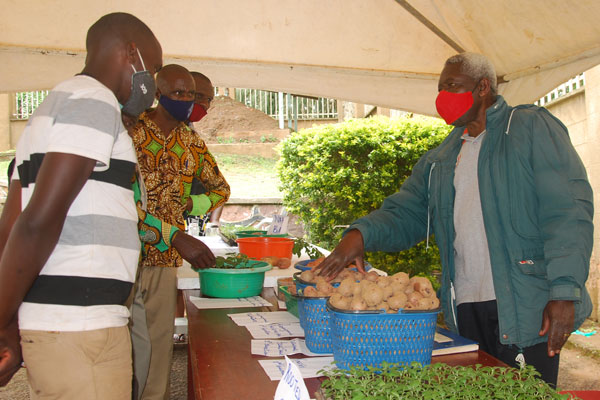Naro asks farmers to embrace new technologies

Farmers looking at some of the newly-developed sweet potatoes at Kacwekano Zonal Agriculture and Research Institute on Saturday. PHOTO/FELIX AINEBYOONA
What you need to know:
- The head of World Food Programme (WFP) Southwest, Ms Emily Doe, said there is need to support local farmers in the food chain to improve the quality of produce.
The National Agriculture Research Organisation (Naro) has asked extension workers to increase farmers’ uptake of new technologies to boost productivity.
The Naro deputy director of general agriculture technology promotion, Dr Sadik Kassim, who was speaking at the celebrations held to mark the World Food Day at Kacwekano Zonal Agricultural Research and Development Institute at the weekend, said Naro makes research and generates seeds that are resistant to disease and climatic changes, but there is low uptake of the technologies.
“After bridging the gap in production between research and the farmers, the biggest challenge is post-harvest handling. In all communities you go to, the facilities are not there. We need to work together with extension workers,” Dr Kassim said.
He added: “To do our work very well, we must partner with district production officers and all extension workers.’’
The director of research at Kacwekano Zonal Agricultural Research and Development Institute that falls under Naro, Dr Alex Barekye, said they generate technologies to help farmers increase their productivity, fight hunger, famine, and poverty.
“The rate of uptake of technologies with farmers is low and this affects their productivity. We need to support farmers in that area. We must work with extension workers to reach them,” Dr Barekye said.
The chairperson user committee at Naro, who also doubles as the director general of National Agriculture Advisory Services, Dr Samuel Mugasi, said: “We challenge extension workers to make sure that these technologies are taken out to the farmers.”
He said despite the low uptake of the technologies, they face a challenge of limited funding, which has affected the performance of the organisation.
“Funding for Naro and research is a problem because we largely rely on donors. We are urging the government to increase funding for Naro. The government has also promised to increase salaries for scientists, but they should also increase the budget for research,” Dr Mugasi said. He added: “Naro receives about Shs100 billion from the government which is not enough compared to the amount of work being done. Naro has started its own programme called Naro Holdings, which will help generate its own income.’’
The head of World Food Programme (WFP) Southwest, Ms Emily Doe, said there is need to support local farmers in the food chain to improve the quality of produce.
“Local farmers are an important part of the food system. WFP now purchases 80 percent of its food locally. We have collaborated with our non-governmental organisation partners to strengthen the knowledge and skills of 25,500 smallholder farmers in post-harvest management, bulking and collective marketing,” Ms Emily said.



